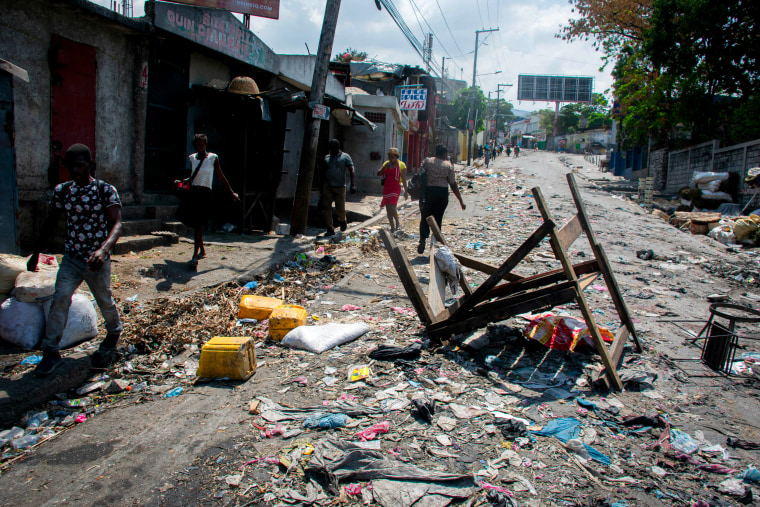More than 53,000 people have fled Haiti’s capital in less than three weeks, the vast majority to escape unrelenting gang violence, according to a United Nations report released Tuesday.
More than 60% are headed to Haiti’s rural southern region, which worries U.N. officials.
“Our humanitarian colleagues emphasized that these departments do not have sufficient infrastructure, and host communities do not have sufficient resources, to cope with the large number of people fleeing Port-au-Prince,” said U.N. spokesman Stephane Dujarric.
The southern region already hosts more than 116,000 Haitians who previously left Port-au-Prince, according to the report by the U.N.’s International Organization for Migration.
The exodus from the capital of some 3 million people began shortly after powerful gangs launched a series of attacks on government institutions at the end of February. Gunmen have burned police stations, opened fire on the main international airport that remains closed and stormed Haiti’s two biggest prisons, releasing more than 4,000 inmates.
Earlier this week the Université d’Etat d’Haïti, or the State University of Haiti, announced that it had been attacked, destroying its hospital and at least six classrooms on the Port-au-Prince campus, according to initial assessments.
Armed groups set fire to pharmacies and health clinics near the university hospital, which is closed, and have turned the hospital into a fortified base, engaging in confrontations with the police, according to a statement by the university. Dr. Jude Milce, the director general of the hospital, had announced plans to reopen the hospital on Monday, but gangs thwarted that plan as they stormed the area.
In addition to taking over the hospital, several instructional buildings were also targeted by acts of looting, vandalism and illegal occupation, before parts of the buildings were set on fire on March 28, according to the university.
More than 1,500 people have been reported killed up to March 22, and another 17,000 have been left homeless, according to the U.N.
Among the rare travelers trying to head north instead of south from the capital were Marjorie Michelle-Jean, a 42-year-old street vendor, and her two children, ages 4 and 7.
“I want to see them alive,” she said, explaining that stray bullets keep hitting the tin roof of their home. Last week, they tried twice to travel to her hometown of Mirebalais in central Haiti but were forced to turn back because of roadblocks.
“I will definitely try again,” she said. “It’s absolutely not safe in Port-au-Prince.”
Of the 53,125 people who fled Port-au-Prince from March 8-27, nearly 70% already had been forced to abandon their homes and were living with relatives or in crowded and unsanitary makeshift shelters across the capital, the U.N. found.
More than 90% of Haitians leaving the capital have been crowding into buses, risking travel through gang-controlled territory where gang rapes have been reported and gunmen have been known to open fire on public transport.
The violence forced Prime Minister Ariel Henry to announce last month that he would resign once a transitional presidential council is created. Henry was in Kenya to push for the U.N.-backed deployment of a police force from the East African country when the attacks began, and he remains locked out of Haiti.
The transitional council, which will be responsible for choosing a new prime minister and council of ministers, has yet to be formally established.
The mass migration from Port-au-Prince is expected to continue, but Gary Dorval, 29, who was among a handful of people joining a demonstration on Tuesday, said he wants to stay until a new government is installed: “I want to be part of the change.”

